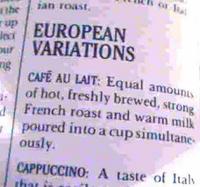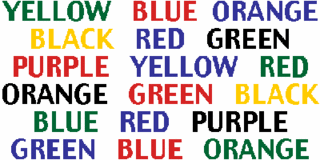Coffee Taste Descriptions for General Roasts
fill your cup!
•
Brazil Bourbon: Soft, neutral to sweet, light body, very low to no acidity.
•
Celebes Kalosi: Heavy body, almost syrupy richness, spicy, balanced acidity.
•
Colombian Supremo: Smooth, mild, medium body, medium acid with high aromatics.
•
Colombian Excelso: Like Supremo but sometimes with more intensity.
•
Colombian Decaf: German Processed. Less body and acid than the Supremos and Excelsos.
•
Colombian Decaf: Swiss Water. Less flavorful than German processing.
•
Costa Rican Tarrazu: Clean, crisp, between medium and full body with high acidity, good aroma.
•
Ethiopian Harrar: Heavy body, complex spiciness, slightly wild, light acidity, typical mocha flavor.
•
Ethiopian Sidamo: Lighter body than Harrar, more acid, balanced by greater sweetness, complex, spicy aroma.
•
Guatemalan Antigua: Smoky, chocolate tones, medium to heavy body, medium but zesty acidity, dry nose.
•
Honduran Strictly High Grown (SHG): Medium to light body, good acidity, neutral to harsh cup with good aroma.
•
Indian Monsoonal: Flavor similar to aged Sumatra but with corky, woody nuances--an acquired taste.
•
Jamaican High Mountain: Good acid and body, slightly sweet with delicately seductive flavors, fine aroma.
•
Java Estate: Sweet, medium in acidity and body,some times with a slightly rubbery yet provocative undertone.
•
Kenya AA: Brisk, snappy, medium body yet intense flavor with a dry winey aftertaste.
•
Kona Fancy: Full body, fine aroma, exceptional flavor.
•
Kona Extra Fancy: Full bodied, fine aroma, considered the best of the Konas.
•
Malawi Plantation: Light body, medium acidity, equivalent to a Kenya AB, floral aroma.
•
Mexican Altura: Sweeter and lower in acidity than Central Americans but nonetheless rich in flavor.
•
New Guinea Estate: Strong, fragrant aroma, balanced acidity, medium to full body, hints of chocolate, with pleasing, aftertaste.
•
Panama Boquete: Medium body and acidity, clean with a rich flavor, great for Vienna and dark roasts.
•
Peruvian Organic: Simple, mild flavor, good acidity and body.
•
Sumatran Mandheling: Heavy, full bodied, spicy, earthy taste, low to mild acidity.
•
Sumatran Decaf German Process: Milder and less distinctive than regular Sumatran, but considered the richest decaf.
•
Sumatran Decaf Swiss Water: Less flavorful but more environmentally correct.
•
Tanzanian Peaberry: Full body, medium acidity, intense flavor, excellent fragrance.
•
Thai Robusta: Harsh, woody, heavy body, acquired taste.
•
Three-Bean Decaf: Typical restaurant or supermarket style decaf.
•
Vietnamese Robusta: Strong, heavy flavors with pronounced woodiness perfect for sweetened iced coffees.
•
Zimbabwe AA: Good, clean, sweet, medium body with good acidity, takes dark roasts well.
 Africa Coffee
Africa Coffee


